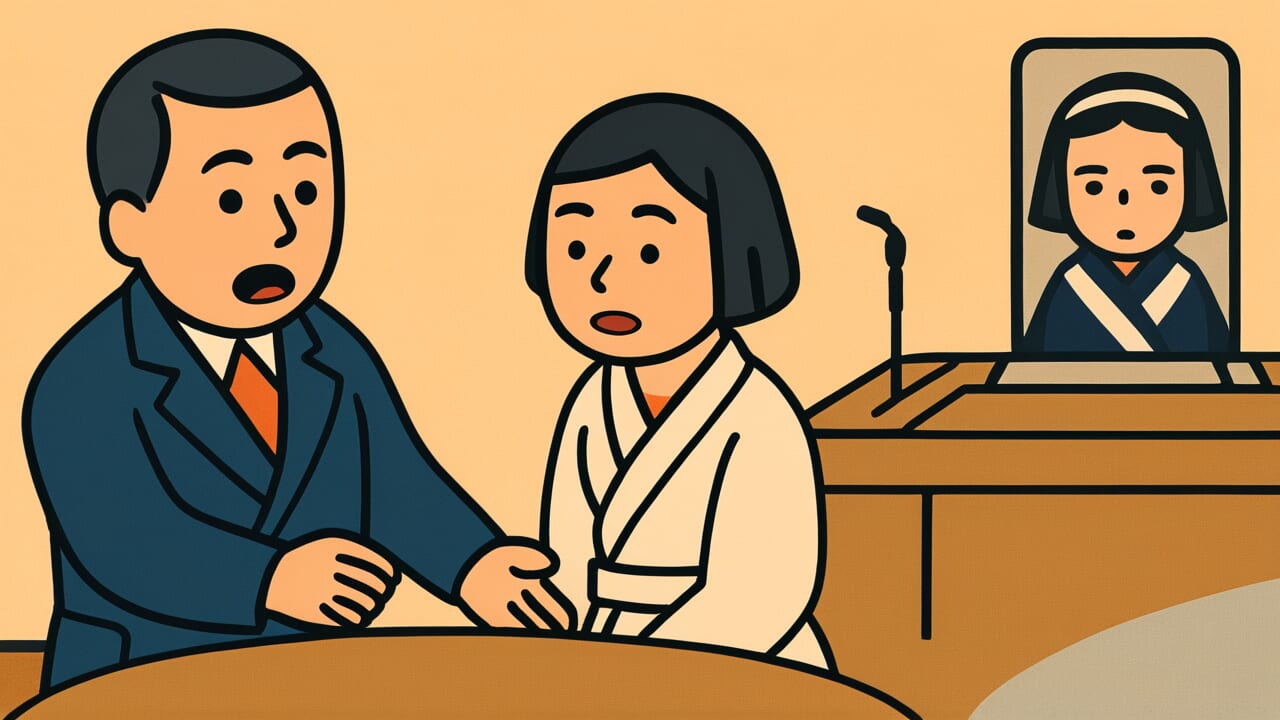How to Read “In Edo it’s ‘berabo,’ in Kyoto it’s ‘dosue'”
Edo berabō ni kyō dosue
Meaning of “In Edo it’s ‘berabo,’ in Kyoto it’s ‘dosue'”
This proverb captures the distinctive speech patterns and cultural differences between Edo and Kyoto. It contrasts Edo’s “berabo,” a bold and direct expression, with Kyoto’s “dosue,” a soft and indirect phrase.
These two expressions symbolize the cultural personalities of both cities.
People use this proverb to explain how language and expression vary greatly by region. Even within Japan, the way people communicate and express emotions differs based on their environment and culture.
The proverb illustrates this with concrete examples. Today, it still offers valuable insights into regional cultural diversity and different communication styles.
Origin and Etymology
The exact literary origin of this proverb is unclear. However, scholars believe it emerged during the mid-Edo period or later.
It spread among common people as an expression contrasting the cultures of Japan’s two major cities.
“Berabo” represents the downtown speech of Edo. Edo natives used it daily as an exclamation expressing surprise or exasperation. The word captures the crisp, straightforward, and spirited temperament of Edo people.
“Dosue” is known as a feminine speech ending in Kyoto. It has a soft and elegant sound.
Placing these two words side by side vividly highlights the contrast. Edo’s culture was vigorous and emotionally direct. Kyoto’s culture was refined and indirect.
Edo developed as the center of samurai culture. Merchants and craftsmen built a lively city there. Kyoto, as the capital for a thousand years, inherited aristocratic traditions.
The city cherished refined speech and manners.
This proverb does more than point out linguistic differences. It humorously expresses the distinct cultures and temperaments each region nurtured.
Interesting Facts
Several theories exist about the origin of “berabo.” The most credible suggests it comes from “Benranbo,” a person with unusual features who was popular as a sideshow attraction during the Edo period.
His strange appearance led to the word spreading as an expression of surprise or bewilderment.
Kyoto’s “dosu” and “dosue” evolved from “dousu,” which meant “that’s right.” Kyoto developed speech patterns that avoided direct statements and conveyed things softly.
This reflects how aristocratic society’s careful word choice influenced common people’s language.
Usage Examples
- Tokyo people say what they think directly, but Kyoto people communicate indirectly—it’s truly “In Edo it’s ‘berabo,’ in Kyoto it’s ‘dosue'”
- They say “In Edo it’s ‘berabo,’ in Kyoto it’s ‘dosue,'” but I think both cultures have wonderful individuality
Universal Wisdom
This proverb teaches us that human communication takes many forms, each with deep meaning. Why did humanity develop different expression methods in different places?
Because each region’s history, environment, and way of life became engraved in its language.
The direct expression symbolized by Edo’s “berabo” emerged from necessity. In a bustling city full of merchants and craftsmen, people needed to communicate quickly. Their language reflected values of efficiency and not wasting time.
Kyoto’s indirect expression, represented by “dosue,” grew from a culture that valued relationship subtleties. It embodies wisdom for conveying intentions while avoiding hurt and maintaining harmony.
Humans naturally feel their own culture’s expression methods are “normal.” However, countless versions of “normal” exist worldwide, each with its own logic and beauty.
This proverb reminds us not to judge different expression methods as superior or inferior. Instead, we should understand the culture and values behind them. Accepting diversity forms the foundation for building a rich human society.
When AI Hears This
When pronouncing “berabo,” our mouths open wide. The plosive “ba” releases air all at once. Acoustic measurements show this pronunciation creates sharp peaks in the frequency spectrum.
Sound pressure levels rise instantaneously. “Dosue” contains the fricative “su.” The mouth opens less, and the sound rises gradually. The physical sound structures of Edo and Kyoto’s representative expressions are completely opposite.
What’s fascinating is how this phonetic difference perfectly matches emotional expression styles. Plosives physiologically require “release of restraint.” This action of stopping breath and then releasing it suddenly synchronizes with the Edo temperament of expressing emotions outward without holding back.
Fricatives are sustained, adjustable sounds. The “su” in “dosue” requires fine control of breath flow while pronouncing. This structurally corresponds to Kyoto’s indirect expression of emotions in stages.
When humans choose dialects, they’re not simply selecting vocabulary. They’re reproducing, at a bodily level, phonetic structures that match regional emotional expression patterns. The mouth shape that shouts “berabo” already embodies Edo directness physically.
Lessons for Today
This proverb teaches you the importance of flexibility in accepting communication diversity. In our globalizing world, we increasingly work with people from different cultural backgrounds.
When someone’s expression style differs from yours, don’t reject or misunderstand it. Instead, try to understand the culture and values behind it.
In workplaces, some people state opinions directly while others communicate indirectly. Neither approach is right or wrong. What matters is recognizing your counterpart’s communication style and making an effort to read their intentions correctly.
Also, having flexibility to adjust your own expression methods according to situations helps build richer relationships.
Diversity is society’s strength. When different expression methods and ways of thinking coexist, we gain deeper understanding and creativity.
Value the people around you who express themselves differently. They bring you new perspectives.



Comments